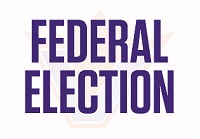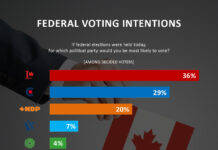WITH recent polls indicating that it will be a close race between the Liberals and the Conservatives, everybody’s wondering what the results will be on Monday, October 21.
So, here we go:
Possibility 1:
The Liberals manage to garner a slim majority.
That could be possible because young Canadians are terribly wary of false right-wing propaganda with Conservative Party Leader Andrew Scheer turning a blind eye to it whenever it suits him and it’s their vote that will in all probability decide the fate of Justin Trudeau’s Liberals. That is becoming pretty obvious now because in spite of all the uproar about Trudeau’s blackface / brownface blunders, the SNC-Lavalin scandal and other controversies, Trudeau and the Liberals have maintained their support. It’s like ‘yes, we know politicians are hypocritical to some extent or the other, but one has to choose the lesser evil in politics!’
There is also deep distrust among the majority of younger voters about the Conservatives on issues such as abortion (or free choice) and LGBTQ2 (lesbian, gay, bisexual, transgender, questioning, queer).
The possibility of the Liberals getting a majority is bolstered by the fact that they have an advantage in vote-rich Ontario and Quebec (at least for now), whereas the Conservatives’ huge support in Alberta, Manitoba and Saskatchewan translates into fewer seats by comparison. So, the “neck-and neck” scenario does not mean equal number of seats.
Possibility 2:
The Liberals end up with a minority government – and depend on NDP and/or Green Party support.
At least, that’s what the NDP and the Greens are hoping for so that they can influence government policy much as the BC Green Party has succeeded in doing so with the NDP government in BC. The NDP Leader Jagmeet Singh has said that he will not support the Conservatives, while Green Party Leader Elizabeth May says she has no problem with also supporting the Conservatives. Some feel that Trudeau has been too immature and/or arrogant and needs discipline – and a minority government will keep him in check.
There is also the question of whether the Bloc Quebecois (BQ) would support a Liberal or a Conservative minority government.
Possibility 3:
The Conservatives get to form the next government with a slim majority.
There are many reasons that Canadians may decide to elect a Conservative government – and many of them may not tell pollsters the truth about their intentions for fear of being labelled racist or bigoted in some circles. There are many conservative Christians – including many of Chinese origin in particular – and people of other religions who are against abortion and LGBTQ2 rights, for example, but still not all of them will automatically vote for the Conservatives – or the People’s Party of Canada.
There are also those immigrants who feel that Canada is letting in too many immigrants too fast. The Conservatives took full advantage of the murder of a 13-year-old Chinese girl, Marissa Shen, in Burnaby in which a Syrian refugee (a Muslim) was charged and arrested. The Conservatives went out of the way to use that one unfortunate incident in their campaign in the Burnaby South by-election earlier this year, but the NDP still ended up winning there.
Also, there are many Canadians who believe, rightly or wrongly, that the Conservatives are more fiscally responsible than the Liberals.
Possibility 4:
The Conservatives end up forming a minority government with the support of the Green Party.
May told the media that it’s important for all parties to speak with each other and be open to negotiations. She said that the Greens would only support a party if it takes the necessary steps to respond to climate change. But that could well backfire if voters feel the Green Party is just a one-issue one and an opportunist.
Also, for the Conservatives it will be real test of the future of their party. Will they get more or significantly more votes than their traditional ones? If they don’t, then their party’s future will look rather dim with the older generation members passing away and most younger generation Canadians rejecting what it stands for.











